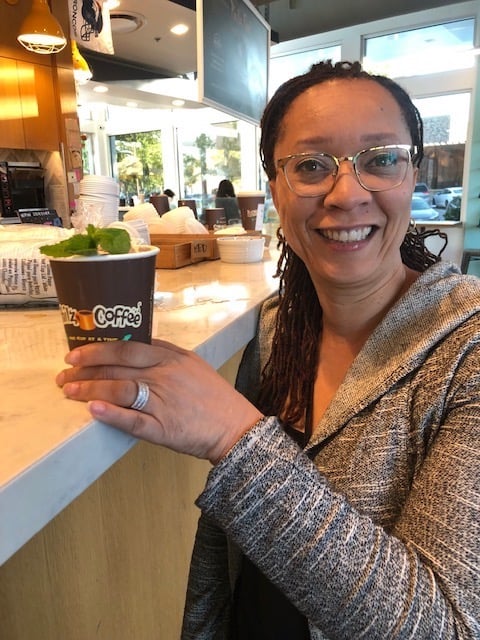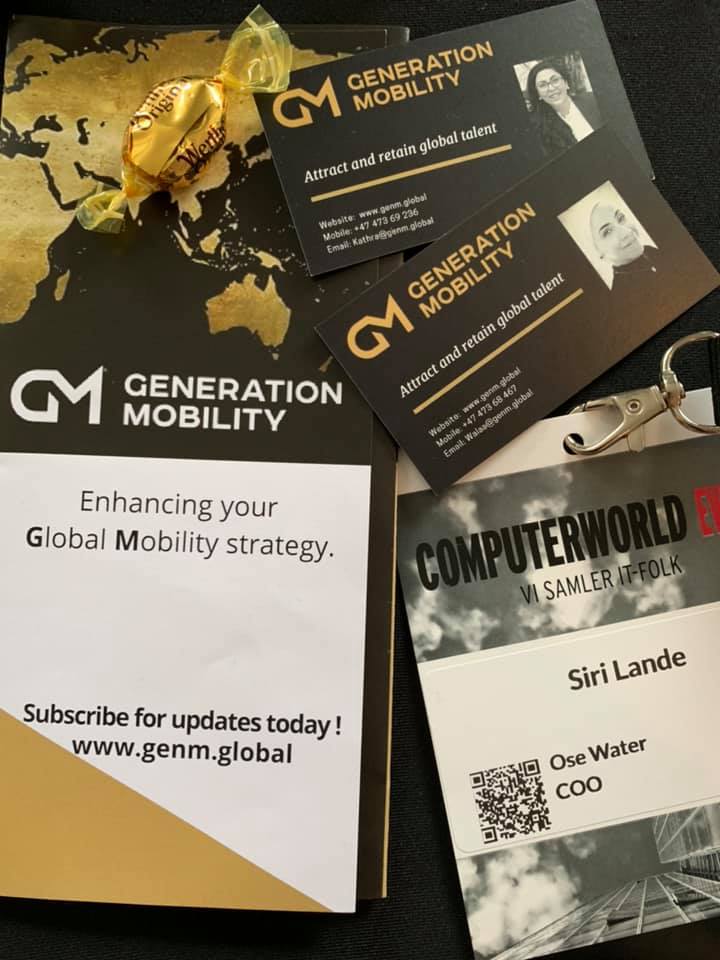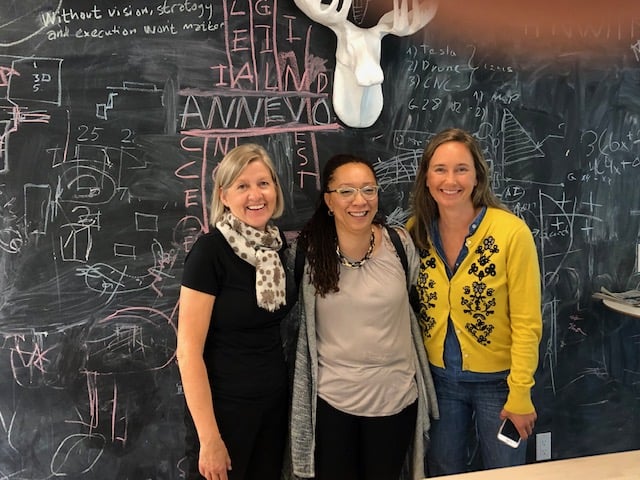In our opinion, when we think about an ‘international’ woman in Norway, whose name is a both a brand and a verb, Alicia Partee comes to mind. Alicia is a brand because she is an advocate for progress, she holds strong and defendable opinions, is all around a force of nature, and simply makes us feel good about being who we are. For Alicia, progress does not only involve outward professional wellbeing, but also incorporates the entire ecosystem that includes social, emotional and psychological welfare of an individual and those around them. For this reason, we associate her with the verb “flourish.”
We learned about Alicia a few years ago through her work with the Professional Women’s Network. A few months afterwards, we had the opportunity to hear her speak at an event, and we became total fangirls. Sometime thereafter, we heard about her company, Global Counselling Solutions (GCS) and since then, her name has rightfully popped up on our social medial feeds and in conversations about elevating the condition of women, businesses and foreign workers in Norway. These days, Alicia serves as CEO to Generation Mobility (GenM), a company that emerged out of a marriage between Global Counselling Solutions and Generation2lead. Generation Mobility is a platform and an app with a primary mandate to facilitate comprehensive progress for anyone living outside of their home country and the companies that hire them.
We find Alicia inspiring because her story echoes that of many. In 2013, she moved to Norway when her husband pursued a career opportunity here. Alicia admittedly was told and thus assumed that because of her vast experience and qualifications, transitioning in Norway would be relatively easy. To the contrary, she discovered that the challenges of moving and thriving abroad – emotionally, socially and professionally – were manifold and widely felt by people and families in transition. After enduring two challenging years and a couple of jobs later, she knew she needed to find a way to be her authentic self in her new world. She sought out opportunities that would use her natural strengths, experience and education, and enable her to make the impact she knew she could make.
At Diversify, we know both firsthand and through the experiences of many who connect with us, the emotional, mental and physical toll that moving to a new country and trying to integrate can have on a person. We also know how isolating it feels without any, never mind adequate, support system. Sometimes, people who struggle do not know where to look for supportive tools, and other times, where employers have tried to provide some support, available solutions are either tone deaf or inadequate – in a sense, seemingly a one-size-fits-all or like placing a Band-Aid over a bullet wound.
So, to see an individual, and an experienced powerhouse of a woman, who has dedicated her life and consistently works to address and improve this situation for many motivates and excites us. In our view, digging deep to fully understand and address a problem as a medium to help and see people thrive is a connecting thread in all that Alicia does. Be it with the organizations she oversees, companies she is a part of, or in the topics she chooses to address when we have the privilege to hear her speak. She is driven by a singular and powerful vision:
To break down the barriers that prevent people and businesses from thriving globally, and to use technology to scale the solution.
Generation Mobility is a ray of sunshine because it tackles the root cause of the many symptoms people across the world encounter on their paths to integrating into their new countries. Because of Generation Mobility, Alicia and her team of equally inspiring co-founders, people will have supportive tools at their fingertips, whenever and wherever they may need them. We are thrilled for the much-needed work that Generation Mobility is taken on and the gaps they will fill for many – individual, families, and businesses alike.
Read and learn more about GenM from Alicia below.

“Can you tell us about how Generation Mobility came to be?”
Since 2016, I have actively helped women in leadership to thrive as VP Mentorship and then President of the Professional Women’s Network in Norway. Soon after, I founded Global Counseling Solutions, a service dedicated to empowering people to thrive abroad, and then co-founded Generation Mobility, a technology driven solutions provider aimed at helping organizations take care of their global workforce and their families. Generation Mobility came to be after three women with similar visions joined forces to change the way people work globally. Being two of the eight companies that graduated from the first Founder Institute Accelerator cohort in Norway, Generation2Lead and Global Counselling Solutions were on a path to success. With funds received from Innovation Norway, both companies set out to validate the market and learned that they were better together. Generation Mobility was launched!
“Why is there a need for a company like GM in Norway in particular? How is diversity and inclusion embedded or reflected in GM’s work?“

Relocating for a new job or assignment can be an exciting change for most people – a new beginning, a chance for a grand reset. Plus, the international work experience puts another feather in the employability hat, gives the employee in question an edge over the competition in the job market and increases their earning potential.
No matter how positive the experience is, though, moving from one work environment to another and uprooting the family does cause a degree of stress that hardly goes unnoticed. The feeling of ‘progress’ or the excitement about the new project might be very real for the employee themselves. Their trailing spouses or the kids, however, might not share the same sentiment.
The kids don’t want to leave the school they’ve grown used to, or their friends behind to start over somewhere else. The trailing spouse might need to quit a job they love, leave a social and professional network behind, perhaps leave family behind, and start over, too. The rest of the family has less of a sense of purpose attached to the move. In many cases, that leads to a stressful home environment.
This domestic stress often manifests as a drop-in work performance, or worse – the desire (or decision) to withdraw from the new assignment, and return home. For a business, that withdrawal means monetary costs up to $400,000. And that’s not taking into account the time and effort wasted, and the hits that employee morale and company reputation take in the process. Studies show that the number one reason behind international assignment failure has to do with family members not being able to adapt and settle into their new environments.

“Who are your target groups? And how does GM connect global talents to opportunities?“
Our target group are companies that hire or want to hire global talent. We are a B2B company. Our goal is to work with HR, Global Mobility Managers and departments.
“How can companies help employees who have relocated?”
This might seem entirely outside of the scope of a typical HR department, but ensuring a happy home and addressing the overall well-being of an employee is crucial for a business to succeed truly.
Employers today tend to tick all the boxes when it comes to the practicalities of transition. Immigration. Check. Housing. Check. School. Check. Training on the new job. Check.
But what about career counseling for the trailing spouse? What about information on the human and emotional response to transitioning to a new country? What about checking in on the employee to see if they’re comfortable in their new work environment?
These softer aspects often get overlooked and overshadowed by the technicalities of the move and the bustle of settling in and getting that new project off the ground.
The problem is the lack of holistic awareness of the issue.
According to a Global Mobility study conducted by Deloitte, 43% of the surveyed HR Executives saw global mobility as a critical business competency. But only 10% of them said that their company shared the same view.
Employers need to develop a greater understanding of the problems associated with geographic transfers. One way to do this might be by communicating with the employee and their family regularly. Many companies don’t have the systems, people or processes in place to do that, though.
Another option is to allow employees and their families to access information, learning tools, and the community support they need to thrive abroad.
At Generation Mobility, our mission is to equip as many businesses as we can with the tools to demystify global mobility. We’re on a mission to un-limit human potential. In an increasingly globalized world, it makes little sense that matters concerning global mobility should slow organisations down. Our service is aimed at putting these growing global companies on the fast-track with well-designed, perfectly-executed, evidence-based solutions.

“What role does the emotional effects of moving abroad play in an employees’ or their family’s wellbeing? How might a company better support their employees in this regard?”
We humans feel a whirlwind of emotion in the face of (sudden) change – excitement, fear, positivity, anxiety. It’s a constant barrage of ups and downs.
Relocation to live and work in a different city or country is one of those life-altering changes, and no matter how prepared we feel, the emotional rollercoaster is coming with it. Before and after a move overseas, most people move along the same ‘transition’ cycle. There are good days, bad days, days of adjustment and understanding, days when we feel like we just don’t belong, and days that feel like this might work out pretty well after all. It’s the bad days, however, the dips in that transition cycle, that make moving one of the top stressors in the world.
As an employer, a growing international business, or as an employee, you’ve probably either tackled the stresses of relocation first-hand or dealt with its consequences in the workplace. Whether it’s a drop in productivity or unhappiness at home, these consequences can be devastating and leave a lasting emotional and financial impact in many cases.
Now, what if I told you that the answer to this increasingly common global mobility problem lies in Artificial Intelligence (AI)? What if AI could prove to be that one tool that helps overseas employees deal with the stresses of transition, help them quickly adapt and thrive wherever they go?
“Where does traditional therapy fall short?”
The conventional solution to dealing with stress and anxiety of any kind is to see a therapist. While coaching and psychological treatments can be helpful, they hardly serve as the ‘companion’ we need when we’re in the thick of transition.
The low points come out of the blue – homesickness one morning when you’re commuting to work, or the sudden urge to be with family when the holidays are around the corner, and you see families huddled around fires with hot chocolate.
For many of us, this can lead to a downward spiral that holds us back from settling into our new homes. But you can’t reach your therapist or counselor right then when you need comfort and conversation. You have to wait until your appointment at 3 pm on a Thursday.
“Can Artificial Intelligence be the shoulder employees need to lean on?”
AI can bridge the gap by serving as your pocket companion. You can have on your fingertips, articles, videos, support material, and even a Live Chat to help you through those times – more support and exactly when you need it.
AI for Self-Actualization When We Need It Most
Self-actualization is an active method of self-help or self-fulfillment that a lot of us rely on consciously or subconsciously. It guides us back on the forward-moving track when we veer off, especially in the face of a big change like relocation.

But when things are turbulent, and our internal compass needs a little rewiring, AI can prove to be an effective support tool.
If you have been through the experience of relocating to a whole new country yourself or seen your employees through the transition, think about this: Wouldn’t it have helped to have a tool or a platform that checked in on how you felt? Something that asked you a structured set of questions and gave you a few tips and tricks to feel a little more equipped to take on the challenges of your new environment?
With AI’s exponentially-growing possibilities, and bots being as intelligent as they are today, it is very possible to ask the right questions, predict a user’s state of mind, and serve as an intuitive in-pocket compass. Machine learning, using real-time data, allows us to learn from each transition. Resultantly, we can predict challenges you may have and provide solutions prior to you needing it.
AI also serves its users as and when they like it. At a time when little seems to be in your control, that autonomy comes as a blessing.
Through Generation Mobility (GenM) and in all that I do beyond GenM too, I want to see people thrive wherever they go in the world. The goal is to make the transition as comfortable as possible and provide practical and reliable solutions that can be implemented daily.
It took me years to find my feet when I relocated to Norway six years ago. It’s become a personal goal to shave those years off of as many people’s journeys as I can.

“We understand that whilst a global company, your base for GM is Norway. Being the seasoned entrepreneur and professional that you are, what challenges do you anticipate you’d encounter in your work? Where do you see gaps and opportunities?“
The biggest challenge is raising awareness to a problem that have been invisible to so many, that is the emotional transition with moving aboard and the difficulty with all migrant groups: expat, migrant, trailing spouse, student, etc.
“In your experience, is there a difference between men and women with regard to how they are emotionally affected by moving abroad (either/both as employees or as trailing spouses)?”
Yes and no. I find that more women seek support than men. However, when expressing what they are experiencing in the transition, it is very similar. For the employee/trailing partner – the employee usually gains an instant network, unlike the trailing partner. You heard the saying, “happy wife, happy life.” This usually applied in this instance. If the partner is struggling, the employee will struggle too. The employer may not recognize any change until it affects the performance, the project or the finances.






It has been amazing to see your resilience, vision and journey to Generation Mobility. So good to read the whole story and see the pics, where you are always smiling. I look forward to the AI as well! 🙂